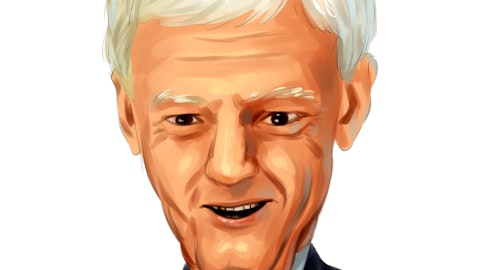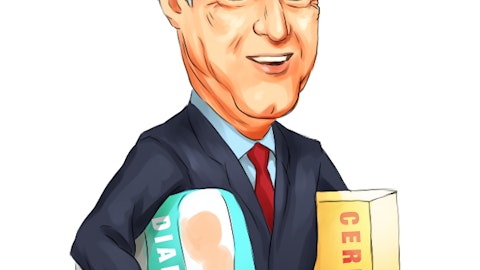Evan Masyr: I think a couple of things that did a little better. When we were putting together our guidance for the fourth quarter, the biggest glaring negative was publishing and just because of the slate of books that we had in the fourth quarter of the prior year. But we did have a better Q4 with the books that Dave mentioned, Justice Corrupted by Ted Cruz and Letters to the American Church by Eric Metaxas. That was definitely a part of why we did better than we expected from a guidance perspective. And I think political came in a little bit stronger as well.
Edward Reily: Okay. And it seems we’re really targeting the Florida market. Just with regard to capital allocation, should we maybe expect more of the same for next year?
Evan Masyr: I don’t see us at this point adding any additional licenses in the Miami market. I think we feel good with the 3 licenses that we have that we can achieve what we’re trying to accomplish there.
Operator: And we’ll take our next question now from David Marsh of Singular Research.
David Marsh: As we look out throughout the rest of the year, are there any publishing titles that you guys are particularly excited about that could get publishing moving back in the right direction?
David Evans: I wouldn’t call out one particular home run title. But when I look at the slate as a whole, I think we will see both revenue and profit growth for the Book Publishing business in 2023 compared to 2022. If I were to mention specific titles and authors, I’d list books from Josh Hawley, George Gilder, Gad Saad, The Babylon Bee, Tulsi Gabbard and Ted Cruz.
David Marsh: Okay. That’s very helpful. I appreciate that. And then when you guys take a look at the asset portfolio as a whole, are there any particular assets it makes sense to possibly look at divesting here? I know it’s a tough market right now, but as you look at the portfolio overall, are there any that stand out as ones that maybe could use a source of liquidity going forward?
David Santrella: Well, I can tell you, we’re constantly assessing that, whether it’s real estate that we have and continually looking at real estate and changing values there. And then we constantly look at the performance of all of our individual business units and assess on a regular basis, if they’re best in our hands or best in the hands of somebody else.
David Marsh: Sure. That’s fair. And then, I guess, just lastly for me. XM just had — SiriusXM just had reduction in force. I was just curious if perhaps there’s some — maybe some talent available that wasn’t perhaps previously available that you guys might be able to add that might helped drive revenue as a result of that reduction in force or any other actions by other operators in the industry?
David Santrella: Yes. I think the best opportunity there is maybe less on the talent side. We always are looking for great talent. And if there’s a good talent that fits the profiles for Salem with our formats. If there’s a good talent there, we certainly will consider them. Where the greater opportunity has been with other workforce reductions both at SiriusXM and at other broadcasters, as we’re investing in Salem Surround and our other digital assets, there’s some very talented people that are available. And of course, we’re looking at them for both sales and sales support within our digital — our digital initiatives.
Operator: And we’ll take a follow-up question now from Michael Kupinski.
Michael Kupinski: I appreciate that. I just kind of wanted to drill down on the expense outlook for Q1. Can you repeat that? What that is? And is that the comparable from Q1 2022 of $55.8 million? If you can just kind of explain that a little bit.
Evan Masyr: Yes. I’ll give you an update or refresh on what the numbers were, and then Dave can maybe talk about what’s driving the increase. So it’s a 7% to 10% increase in expenses from that $55.8 million in the first quarter of ’22. And Dave, do you want to talk about it?
David Santrella: Yes. In terms of the expense guidance, it’s really being impacted by, as I just mentioned, hiring additional digital sales staff to continue to grow our digital business. You have to remember, on the broadcast side of Salem, our digital business is really only about 5 years old. We really launched later than other broadcasters did. We kind of wanted to be faster — fast followers as opposed to pioneers there. And we’re glad that we moved in that direction. But in order to keep it growing, we have to add more people to it. We have to build both larger sales force around it and then a larger digital — kind of a sales infrastructure so that we can fulfill those digital orders in-house. It’s cheaper to fulfill them in-house, but then by using third parties. And so we found that the ROI of new sellers is real positive for us. And with big tech companies laying off really qualified salespeople, we’re able to take advantage of that opportunity.
Michael Kupinski: Is your digital business on the broadcast side profitable at this point? Or how do — yes, right? And so can you kind of give us an idea of what the margins are and where do you think the margins could grow to as this matures?
Evan Masyr: Yes. I guess it’s difficult to look at the margins because we sell a lot of different products. I’d say on average, incrementally, incremental digital is probably in the 35% profit margin range. But as we look to bring some of the stuff in-house, we want to grow that margin.
David Evans: Yes. You can’t really calculate a kind of stand-alone profit margin because it’s sharing the sales team with radio broadcast. It’s sharing with General Manager. So there’s a bunch of shared expenses. It is lower profit margin on an incremental basis than local spot sales because when we’re selling digital, we are selling some owned and operated inventory, but we’re also reselling other people’s inventory. So there is a cost of goods sold to our digital media business that we don’t have with the core local spot business. So it is lower profit margin because of that, but still nicely profitable.
David Santrella: Yes, the cost of goods sold on the local advertising or national spot advertising buckets for that matter, the cost of goods sold is really baked into the operating expenses of the business unit, whereas with digital, there’s a real cost of goods sold. We’re writing a check to somebody for that.
Operator: And gentlemen, it appears we have no further questions this afternoon. Mr. Santrella, I’d like to turn things back to you for any closing comments.
David Santrella: Okay. Well, thanks, everybody, for being a part of the call today. We appreciate it, and we’ll see you again next quarter.
Operator: Thank you, Mr. Santrella. Ladies and gentlemen, that does conclude the Salem Media Group Q4 2022 Earnings Conference Call. We’d like to thank you all so much for joining us and wish you all a great remainder of your day. Goodbye.
Follow Salem Media Group Inc. (OTC:SALM)
Follow Salem Media Group Inc. (OTC:SALM)
Receive real-time insider trading and news alerts




